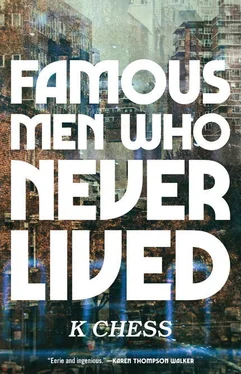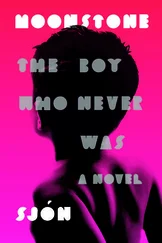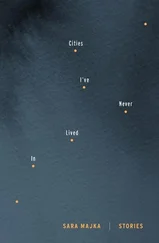“Yes, yes. I’ve looked into all the vanished epidemiologists in some detail myself: Pascal Toussaint’s mother died in a kitchen fire; Louise Stuart’s parents had seven other children, but somehow they were all boys; Jin Fan-Wen was born, but never went to university—that set back the discovery of the causes of cardiovascular disease by almost ten years.” Oliveira sighed. “And there’s Christian Hassel. He was born too, lived to be a teenager, but was then killed by the KomSos—by the Nazis, I mean. They called themselves Nazis here.”
“Wow,” Hel said. “That’s awful.” To her, those born just Before whose lives had ended prematurely were the worst cases, the most frustrating. There was something especially poignant about knowing exactly what these men and women might have accomplished if only history had proceeded the way it ought to have. “All the things they should have done. They need to be memorialized.”
The old man’s eyes were cloudy, but his gaze pierced her. “Our community is so small.”
“But it wouldn’t just be for UDPs! This would benefit everyone! Only we know about these inventors, these discoverers, these artists. It is our duty to share that knowledge with the whole world. Don’t you think? We can make them understand us.”
“A museum dedicated to those who never existed.” He said the words slowly, trying them out. “And what do you think you need to make that happen?”
A fair question. Three hundred and fourteen thousand dollars—that was how much Dwayne Sealy wanted for the house, plus it would have to be cleaned out. Exhibits would have to be created, information compiled from all the other UDPs she could find and cross-checked with the historical record here. The list of tasks was overwhelming. What did she need to make it happen? Money, certainly. Help applying for a grant, perhaps. And some string-pulling. What UDP had the resources? Not even Oliveira. And what non-UDP would possibly want to take on something so unpopular?
She asked herself: What did she really want? Sympathy? She had that. The old man’s enthusiasm, his encouragement? Those couldn’t be bought for a bunch of corner-store carnations. “I don’t know,” she admitted.
“In this life, each of us must find a single thing that we think is worthwhile and do it faithfully,” Oliveira said. “For you, I think that could be practicing medicine again. You and I are fortunate. Like the method of finding proximate and distal causes of disease in a population, the basic laws of the human body will never change. You can work, just as you used to.”
She thought of her years of training. The beautiful complex structures of the head and neck, presented on tissue-thin paper in the texts. And the impossible-to-anticipate variations. The actual flesh under her gloved touch as she cut a straight line from the brow down along the side of the nostril and through the upper lip to remove a paranasal cancer. Cutting the bones, removing part of the hard palate, the orbital, sometimes the eye. The care she’d taken to leave a clear margin. You needed a certain mind-set. A sureness and serenity she didn’t have anymore. “No,” she said savagely. “I don’t want to.”
“It doesn’t have to be medicine, but I think you need to pick one thing. Focus on it. One manageable, attainable goal.”
“What if this is it, though? My goal. This museum?”
They sat quietly for a minute. Hel watched young people in bad clothes kissing, arguing, and looking at their personal digital devices on the other benches. In the center of the piazza, one pigeon tried to mount another, the two birds waddling back and forth at her feet. The aggressor never got anywhere, but his intended victim couldn’t seem to escape his attentions.
“At least help me try,” she said.
Oliveira squeezed the flowers she’d brought between the opposing digits of his left arm, his grip crackling the green cellophane they were wrapped in. “All right,” he said. “I’ll do my best.”
Hel stood in front of the open closet door in her bra, feeling faintly ridiculous. She wore no panties; she wasn’t sure whether underwear would show through the delicate black silk, cut on the bias, of the only dress she owned that would possibly work. She didn’t want to put it on yet; she’d bought the high-necked, unfashionable garment a year ago and worn it only once, to the funeral of a UDP from Vikram’s entry group who’d shot himself in the head.
But tonight, she was headed to an arts fundraiser, and important well-connected people would be there, people Oliveira said she should meet. She had to look formal .
She stepped into her shoes. She wasn’t used to heels—women didn’t wear them at home—but something about the authoritative echo they made pleased her. Still bare-bottomed, she clopped into the living room, crossing to the single pressboard bookshelf squeezed between the window and the radiator, and trailed her fingers down the spines of the titles on the top shelf, looking for an egg-blue cover. Vikram, at work for the night, kept the precious books he’d brought through the Gate on the top shelf, segregated from all of the other books he’d picked up since.
There. The Pyronauts: A Novel by Ezra Sleight. It was an edition Vikram had bought for himself in 2001 or 2002. It contained a foreword by some professor he used to know and an afterword, as well as a chronology of the author’s other works. The cost code appeared on the back cover: $124, in their inflated currency. Priceless now. The only one of its kind.
She’d read the book for the first time just to make Vikram happy. Now, John Gund and Asyl and even Aitch, the stranger they met in the Never, were like old friends. She couldn’t put into words the way the novel made her feel, her celebration of its beauty mixed inevitably with an exquisite sadness that there was no more. None of Sleight’s short stories or other novels survived, no articles, no interviews. The man and the ideas he’d had were completely gone from the world of this After, persisting only in the memories of a few. She decided she would take the book with her as a sort of good luck token, tangible proof she could pull out if called upon.
If only they’d foreseen, when they packed for the cemetery. It was hard to put herself back there—not emotionally hard, though that was true too, but literally hard to remember those days. Traumatic amnesia, the psychologist who once came as a guest speaker to her Reintegration Education meeting had called it. If only there’d been a way for her to understand in advance what it would be like to be shipwrecked in a world populated by seven billion strangers with whom she had nothing in common.
She slipped the book into her capacious bag, and went back into the bedroom to put on the dress.
At Reintegration Education on Wednesday, they watched a DVD that promised to introduce them to the principles of the US criminal justice system. Vikram thought he would have trouble paying attention. He’d spent most of the last week dreaming of the Gate, strung in the sky above Calvary like a loop of Christmas lights—trying to remember while trying to forget. But he found this video unexpectedly absorbing. It began with a reenactment of a witch trial. A young and beautiful white woman in colonial dress was herded to a riverside by a crowd of angry townspeople, who pulled the bonnet off her braided hair and tore at her clothes before pushing her into the water. The camera pulled away before it became clear whether she would float with guilt or sink to the bottom, innocent. The words There Is a Better Way appeared at the bottom of the screen, followed by a shot of the Statue of Liberty.
Читать дальше













